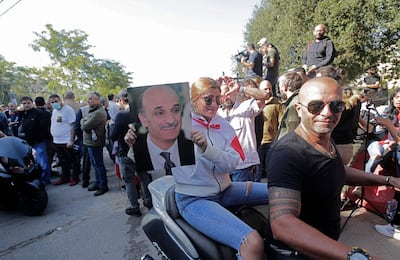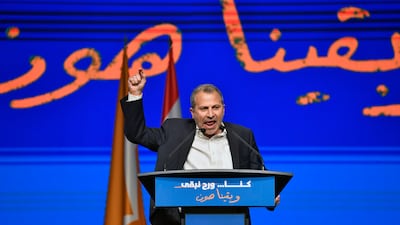Whatever else the Lebanese parliamentary election has done, it has certainly reshuffled the cards when it comes to Lebanon’s presidential candidates. In fact, all the leading candidates face major obstacles to being elected, while the identity of a potential compromise figure seems elusive at best.
Going into the election, many people identified two favourites, based largely on the fact that the main party that had to be satisfied was Hezbollah. The two candidates were Gebran Bassil, the son-in-law of President Michel Aoun and head of the Free Patriotic Movement (FPM), and Suleiman Franjieh, a northern politician close to Syria and Hezbollah and the grandson of a previous Lebanese president with the same name.
To different degrees, the election results damaged the prospects of both men. While Mr Bassil still has a large parliamentary bloc, his party lost ground in terms of seats won when compared to the results it obtained in the 2018 election. Now the largest Christian bloc is that of the Lebanese Forces, with the Bassil-led bloc coming in second.

Mr Bassil tried to portray his bloc as the largest Christian bloc by virtue of its alliances. In this way, he will be able to say that he remains the most legitimate Maronite Christian for the presidency. It’s too early to say whether he will be right, as broader parliamentary blocs are still being negotiated, but in many regards that may be irrelevant. Nothing in the Constitution says the president has to enjoy large parliamentary representation.
Mr Franjieh's is a different story. He is a major political figure in the northern city of Zghorta, but the results hardly reflected this. While his son did win a seat in the constituency, the two other Maronite seats went to one of Mr Franjieh’s main rivals in Zghorta, Michel Mouawad, and to a member of the prominent Doueihi family, who was, however, elected on a list formed by civil society figures opposing the traditional political class.
There was a very narrow silver lining in that one of Mr Franjieh’s candidates won a seat in Bsharri, the village of the Lebanese Forces leader Samir Geagea. But that was hardly enough to create a semblance of success. Indeed, Mr Franjieh himself was very frank in stating: “We barely made it through.”

Mr Franjieh had been presumed to be the leading candidate for the presidency because Mr Bassil is seen as too toxic to win. Parliament elects presidents in Lebanon, and the vast majority of blocs today strongly oppose him. Worse, Mr Bassil is under US sanctions for corruption, and at a time when Lebanon is struggling with a titanic economic and social breakdown, he is the last person the country needs at the helm or who can generate confidence.
Yet, paradoxically, Mr Bassil’s chances may have gained some momentum from Mr Franjieh having done poorly. Mr Bassil will also have been encouraged by the fact that Mr Geagea, suddenly propelled into a leading spot for the presidency by virtue of controlling a large Christian bloc, has guaranteed that Hezbollah will do everything possible to prevent his election. The Lebanese Forces and Hezbollah are mutually hostile and a Geagea presidency is a red line for the pro-Iran party.

However, Mr Geagea will certainly argue that just as Hezbollah backed Mr Aoun as being the most representative Christian in 2016, the party must adopt the same approach today and accept the man with the largest number of Christian votes. But in a polarised country such as Lebanon, there are many political forces, even those who were allied with Mr Geagea in the election, who would oppose his presidency, as it would only divide society more.
At the same time, it is improbable that Hezbollah will today impose a vacuum in Parliament to bring either Mr Bassil or Mr Franjieh to office, as it did for Mr Aoun between 2014 and 2016. The economic and social situation is too catastrophic and volatile to play that game without provoking a severe backlash against the party.
Therefore, is a compromise candidate possible? In situations of national deadlock, all eyes usually turn to the commander of the armed forces, the one state institution that enjoys cross-sectarian regard. Moreover, the present commander, Joseph Aoun, is respected. Yet he has a problem: the army forcibly prevented Hezbollah and Amal members from entering Christian areas last year, when fighting broke out in the Tayyouneh district. Gen Aoun is also viewed by Hezbollah as being close to the Americans.
That doesn’t rule him out, however. The commander has also co-ordinated with Hezbollah throughout his tenure, as all armed forces commanders have. So, if there is a long deadlock over electing the next president, it is conceivable that he could eventually emerge as the fallback choice, since no other candidate seems viable.
All this presages a void that can only do Lebanon more harm as the economic situation deteriorates. Not surprisingly, because of zero-sum Maronite ambitions, the presidential election has become a deadline that the Lebanese have come to dread.


